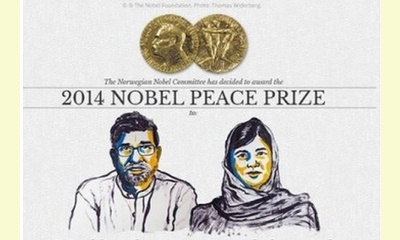|
|
Malala Yousafzai and Kailash Satyarthi win Nobel Peace Prize
un article par Education International
Education International (EI) is celebrating the international
recognition of Kailash Satyarthi, a close friend of EI’s and a tireless
advocate for children’s rights, and Malala Yousafzai, probably the
world’s best-known advocate for the right of every child to access
quality education. 
click on photo to enlarge
“I would like to congratulate both Malala and Kailash for receiving
this extraordinary honour,” expressed EI General Secretary Fred van
Leeuwen. “Their tireless efforts and dedication towards promoting
quality education for all children, often in the face of threats from
those who oppose basic human rights, are being celebrated by all of
us at Education International.”
Malala Yousafzai, 17, from Mingora, Pakistan is the youngest
recipient of the award. On Oct 9, 2012, after becoming an advocate
for girls’ education, she was shot by a Taliban gunman on her way
home from school. She survived, and has become an international
ambassador for education. She was previously nominated for a
Nobel Peace Prize in 2013.
Despite reoccurring Taliban threats, Yousafzai remains a staunch
advocate for the power of education. On October 10, 2013, in
acknowledgement of her work, the European Parliament awarded
Yousafzai the Sakharov Prize for Freedom of Thought.
Kailash Satyarthi, 60, is the founder of the Global March Against
Child Labour, Bachpan Bachao Andolan (BBA), the South Asian
Coalition on Child Servitude (SACCS), and Rugmark. He is based in
New Delhi, India, but his work extends to Bangladesh, Nepal,
Pakistan and Sri Lanka. Satyarthi also sits on the board of the Global
Campaign for Education (GCE).
At the age of 26 Satyarthi gave up his career as an electrical
engineer and dedicated his life to helping the millions of children in
India who were forced into slavery. His original idea was daring: he
decided to mount raids on factories — factories frequently manned
by armed guards — where children, and often entire families, were
held captive as bonded workers.
After successfully freeing and rehabilitating thousands of children,
he went on to create a global movement against child labour.
Today, Kailash continues to lead the Global March Against Child
Labour, a conglomeration of 2000 social-purpose organisations and
trade unions in 140 countries.
|








|
DISCUSSION
Question(s) liée(s) à cet article:
What is the relation between peace and education?,
* * * * *
Commentaire le plus récent:
Letter from Mohatma Gandhi to Maria Montessori.
To Madame Montessori
Even as you, out of your love for children, are endeavoring to teach children, through your numerous institution, the best that can be brought out of them, even so, I hope that it will be possible not only for the children of the wealthy and the well-to-do, but for the children of paupers to receive training of this nature. You have very truly remarked that if we are to reach real peace in this world and if we are to carry on a real war against war, we shall have to begin with children and if they will grow up in their natural innocence, we won't have the struggle, we won't have to pass fruitless idle resolutions, but we shall go from love to love and peace to peace, until at last all the corners of the world are covered with that peace and love for which, consciously or unconsciously, the whole world is hungering.
Mohatma Gandhi, Young India, 19-11-''31

|
|









